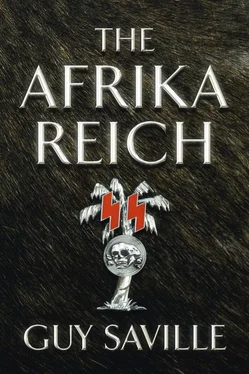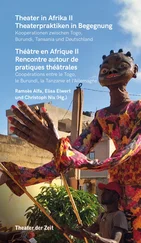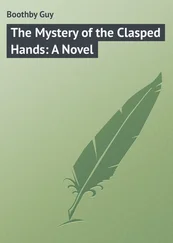Burton glanced at his watch. Everything had gone wrong that night; now he felt crushed by the lack of seconds. This was not how he had envisaged the moment. In his dreams time stood still, there was opportunity for talk and torment.
And answers to all his questions.
Hochburg rose from his desk. The office around him was austere. Naked wooden floors, simple furniture, white walls that smelt of damp and rubbing alcohol. There was a gun cabinet in the corner and shelving for hundreds, possibly thousands, of books – though not a single volume filled them. Overhead a fan remained motionless despite the humidity of the night. Although dark patches were spreading across Burton’s shirt, Hochburg looked as if his body were chilled to the bone. The only decoration in the room was the obligatory portrait of the Führer, another of Bismarck, and maps.
Maps of Aquatoriana, Deutsch Ostafrika, DSWA, Kamerun, Kongo, Muspel: all the dominions of Nazi Africa. The cartography of enslavement, thought Burton. Every last hectare pored over, charted, claimed. In the first years of conquest they had been governed by the Kolonialpolitisches Amt, the KPA, a haphazard civil administration. Later the SS took control.
Hochburg moved towards the opposite end of the room where French doors led out to a veranda.
‘But your diamonds, Herr Oberstgruppenführer,’ said Burton, remaining in his seat. He didn’t relish the idea of killing Hochburg on the balcony in full view of the camp.
‘I said they can wait.’
Burton hesitated, then got to his feet and followed. His jackboots pinched with every step.
Hochburg was already on the veranda. Above him hung a silent wind-chime. He spread his arms with a messianic sweep. ‘Magnificent, isn’t it?’ he declared in a baritone that sounded raw from cognac, even though Burton knew he was a teetotaller. ‘A thing of wonder!’
The official headquarters of the Schutzstaffel, the SS, may have been in Stanleystadt – but this was the real powerbase of Deutsch Kongo. Burton had arrived through the front entrance, past the cranes that were still erecting the imperial façade. The quadrangle below him was at the rear, the hidden part of Hochburg’s fiefdom, used for ceremonial occasions. No one but the SS were allowed here.
It was the size of a parade ground with several storeys of offices on all sides and, according to Ackerman, cellars that went as deep below as the floors above. Bureaucracy and torture: two pillars of Nazi Africa. There were guard towers on each of the corners; a patrol stalking the perimeter with a Doberman. Enough barbed wire for a concentration camp. But it was the ground that most caught Burton’s attention. Searchlights dived and soared over it. For a second he stood dumbfounded at the sheer scale of it. The sheer barbarity. His father would have wept at its sight.
Then his stomach curdled.
‘A wonder!’ repeated Hochburg. ‘You know, when the Reichsführer first saw it he clapped his hands in delight.’
‘I heard that story,’ said Burton. ‘I also heard he filled two sick bags on the flight home.’
Hochburg stiffened slightly. ‘The man has a poor constitution; we gave him a sumptuous dinner.’
Burton glanced at the square again, then turned his eye to the murk of the jungle beyond. Somewhere out there, concealed among the symphony of cicadas and tree frogs, were the rest of his men.
He imagined them: hearts jumpy but mouths set, faces thick with camouflage, counting down the final minutes on their watches. Patrick would already be slowing his breath to maximise the accuracy of his shot… Assuming, of course, they were even there. The team had gone their separate ways twenty-four hours earlier and Burton had no way of knowing if the others had made it to their positions. It was the one flaw in the plan. He might be about to leap into the abyss – with only darkness to break his fall.
‘How many would you say it took?’ continued Hochburg.
‘I’ve no idea, Oberstgruppenführer,’ replied Burton. ‘A thousand?’
‘More. Much more.’ There was a gleam in his eyes. They were the colour of coffee beans and not how Burton remembered them. When they glinted in his nightmares they were black – black as the devil’s hangman. But maybe that was just the years in between. It wasn’t the only difference. Hochburg had also lost his hair, every last follicle of it.
Burton offered another guess. ‘Five thousand?’
‘More still.’
‘Ten?’
‘Twenty,’ said Hochburg. ‘Twenty thousand nigger skulls.’
Burton looked back to the quadrangle and its gruesomely cobbled square. It gave Hochburg’s headquarters their name: the Schädelplatz. The square of skulls. Inside him something screamed. He saw children torn from parents, husbands from wives. Families left watching the horizon for loved ones who would never return home to smile and bicker and gather round the fire. Every skull was one more reason to kill Hochburg.
He saw the view of his childhood, the dark jungle of Togoland. He saw his mother’s empty room.
Burton struggled to keep his voice level. ‘Can you walk on it?’
‘You can turn panzers on it.’
‘How come?’ His brain could only supply nonsense. ‘Have they been fired? Like tiles, to make them hard.’
‘Fired? Like tiles?’ Hochburg stiffened again… then roared with laughter. ‘You I like, Sturmbannführer!’ he said, punching his shoulder. ‘Much better than the usual couriers. Obsequious pricks. There’s hope for the SS yet.’
With each word Burton felt the breath wrenched out of him. He suddenly knew he couldn’t do it. He had killed before, done it so many times he’d grown indifferent to it. But this – this was something else. Something monumental. The desire to do it had been a part of his life for so long that the reality was almost like turning the knife against himself. What would be left afterwards?
Burton tried to glance at his watch but it caught on his sleeve. The minutes were counting down: he was running out of time. On the veranda the wind-chime tinkled briefly.
He must have been crazy to think he could get away with it, that Hochburg would reveal his secrets. Here was a man dedicated to making silence from living, breathing mouths.
Then the moment passed.
At 01:23 the north of the Schädelplatz would vanish in a fire-ball. By then he’d be on his way home, justice done, Hochburg dead. He’d never have to look backwards again. The future would be his for the taking.
‘Your diamonds,’ Burton said, moving decisively towards the study.
But Hochburg barred his way, his eyes drained of humour. He seemed to want reassurance, to be understood. ‘We have to cleanse this place, Sturmbannführer. Let the flames wipe Africa clean. Make it as white as before time. The people, the soil. You understand that, don’t you?’
Burton flinched. ‘Of course, Herr Oberstgruppenführer.’ He tried to pass.
‘Any fool can pull a trigger,’ continued Hochburg, ‘or stamp on a skull. But the square, that’s what makes us different.’
‘Different from who?’
‘The negroid. We’re not savages you know.’
In his mind Burton could hear the precious seconds counting down like a tin cup rapped on a tombstone. He tried to move forward again. This time Hochburg let him through – as if it had been nothing.
They resumed their positions at the desk, the smell of rubbing alcohol more potent than before.
Hochburg poured himself a glass of water from a bottle in front of him – Apollinaris, an SS brand – and downed it in a single, gulpless motion. Then he reached beneath his black shirt for a chain around his neck. He seemed greedy for his loot now. On the chain was a key.
Burton released the attaché case from his wrist and set it on the desk between them, feverishly aware of the blade hidden inside. He thought of the fairy tales Onkel Walter (his gut convulsed at the words) used to read him at night, of Jack lifting the ogre’s harp and it calling to its master. For a moment he was convinced the knife would also speak out, warn Hochburg of the looming danger, its loyalty to Burton forgotten in the presence of the hand that once grasped it.
Читать дальше












